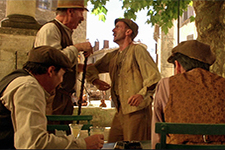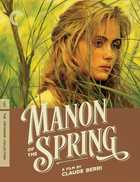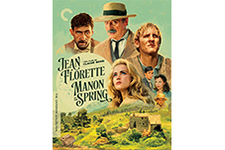Manon of the Spring (Manon des Sources) (4K UHD)
|  Produced simultaneously with Jean de Florette and released six months later, Manon of the Spring (Manon des Sources) brought to a hard, bittersweet conclusion Claude Berri’s highly anticipated adaptation of French literary titan Marcel Pagnol’s two-volume 1963 novel The Water of the Hills (L’Eau des collines). Interestingly, Pagnol, who was also a playwright and filmmaker, had directed his own version of Manon of the Spring in 1952, which he wrote specifically for his wife, actress Jacqueline Bouvier. A decade later, he turned the script into a novel to which he added a prequel, Jean de Florette, which were then published together. The narrative picks up roughly a decade after the events in Jean de Florette, which saw Cesar Soubeyran (Yves Montand), an aging farmer whose dynastic family had long dominated a Provencal region in southern France, and his younger nephew, Ugolin (Daniel Auteuil), recently returned from World War I, cheating the title character out of success on his family’s farm by hiding from him the presence of a spring that was crucial for cultivating the land. That film ended with Cesar and Ugolin, having bought Jean’s farm on the cheap after the poor man’s demise, unblocking the spring that they then planned to use to cultivate the land for themselves. Their celebration is overheard by Jean’s 10-year-old daughter, Manon, who is allowed along with her widowed mother to still live on the land. When we pick up the story roughly a decade later, Jean’s widow has long since moved, while Manon (Emmanuelle Béart), now a woman in her early 20s, has stayed behind, living alone in the hills, tending to a flock of sheep and generally steering clear of everyone in the area. Knowing what Cesar and Ugolin did to her family, but lacking the power to do anything about it, she keeps to herself, nursing a bitter grudge against them, but also against the villagers who live nearby, most of whom knew what was happening, but did nothing about it out of fear of retribution from Cesar. Retribution comes to them anyway, when Manon discovers the source of the village’s water supply in a cave in the hills, which she promptly blocks. Confused and frightened about the the sudden disappearance of their water supply, the villagers turn on each other, berating the mayor and a government expert who is brought in to try to solve the problem. The story is further complicated by the fact that Ugolin falls desperately in love with Manon, who rejects him in angry fashion because she knows of his complicity in her father’s death. Ugolin, unaware that she knows, becomes desperate in his plight to win her heart, reducing him to the same kind of tragic desperation that befell Jean (in a particularly gruesome display of his determination, he literally sews a ribbon of Manon’s to his own flesh). Manon, meanwhile, also catches the eye of a new schoolteacher, Bernard Olivier (Hippolyte Girardot), thus ensuring a love triangle that, as with Jean de Florette, is destined for tragedy. While not quite a powerful as its predecessor, Manon of the Spring nevertheless packs a strong dramatic punch. It was adapted by director Claude Berri and co-writer Gérard Brach, whose screenplay is both efficient and reflective, allowing plenty of room for the characters and their intersecting arcs to further develop. This is particularly true in the film’s poignant final moments, which find Cesar reaping his just rewards, but in such a way that we feel for his loss. As with the previous film, the great Yves Montand plays him as a scoundrel who nevertheless has a great hollowness inside that he desperately wants to fill; his lack of family outside of Ugolin is palpable in its sadness, which is why he is constantly encouraging his nephew to get married and have children. Cesar’s doomed arc reminds us that wealth and power are both earthly and fleeting, and he learns late in the film a hard truth that casts all of his previous decisions and actions in a particularly tragic light. In one of her earliest major roles, Emmanuelle Béart plays Manon as enigmatic and cunning, but also full of fire and rage (she won a César for Best Supporting Actress). We can easily see why Ugolin becomes so fixated on her, although her beauty sometimes comes at the expense of the film’s verisimilitude (for a woman who lives in the hills and tends to sheep, her golden tresses always looks shampoo-commercial ready). And, as Ugolin, Daniel Auteuil (who won a César for the role in Jean de Florette) embodies pathetic desperation and heartbreak, embodying in every way the larger narrative’s tragic ethos.
Copyright © 2025 James Kendrick Thoughts? E-mail James Kendrick All images copyright © The Criterion Collection | |||||||||||||||||||||||||||||
Overall Rating: 


 (3.5)
(3.5)


 This four-disc set includes 4K UHD and Blu-ray discs of Jean de Florette (1986) and Manon of the Spring (1986).
This four-disc set includes 4K UHD and Blu-ray discs of Jean de Florette (1986) and Manon of the Spring (1986).